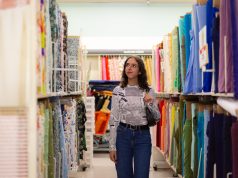After nearly 40 years since the Mariel Crisis, 28 years after the Cuban Rafter Crisis, and just one year following the historical protests of July 11, stakeholders convened at the nation’s capitol to explain Cuba’s migration crisis.
Georgetown University’s Latin American Policy Association (LAPA) and the Migration and Refugee Policy Initiative (MRPI) hosted the panel on Oct. 13 to discuss Cuba’s history, socio-political and economic history.
“The right attitude is pushing this movement forward and in my case, as an attorney, I try to help Cubans. I was able to get out 432 Cubans that were detained in ICE for two years, I visited 13 jails; I didn’t charge a dime. Why? Because those are my brothers and sisters, that’s my blood,” said panelist Miguel Inda Tomero, an Immigration Lawyer.
Other panelists included activist and influencer, Marrissa Daniela, Director for a Center for a Free Cuba, John Suarez, Director of the Cuban Freedom March, Alian Collazo, and adjunct Professor at the Center for Latin American Studies, Hector Schamis. The panel was mediated and organized by FIU alum and Georgetown Graduate student, Angélica Franganillo, who is completing a Master’s in Journalism with a certificate in Latin American Studies.
“I think here in D.C. there’s not a lot of notion of what’s going on in Cuba so that’s what really inspired me to do this,” said Franganillo. “In Miami, in the heart of the exile… after the mass protests of July 11, it really amplified giving my voice. As journalists, we should know that our job is to really amplify those voices that have been silenced like the ones in Cuba to get those stories out.”
Since October 2021, roughly 177,000 refugees from Cuba have reached the United States shores. However, since the 1962 embargo was put in place, the Biden administration continues to uphold this symbol of hostility between the U.S. and Cuba in the midst of the most challenging humanitarian crisis on the island since the 1990’s.
“I have been personally affected by the embargo. I have an OFAC (Office of Foreign Assets Control) investigation on me because I did a donation to the tornado victims and I’m still under investigation by OFAC because of the embargo which deeply affected my financial life,” said Daniela.
Despite the economic embargo having failed to achieve its policy goals and making daily life harder for Cuban families, many panelists expressed other issues the island faces.
“We’re not asking for much. We’re asking for free press, that you have news stations, reporters and journalists that can report on whatever they want. To release all political prisoners… people who have talked bad about the regime and three, have fair elections. Have two parties. Don’t rig the elections, don’t do fraud. I don’t think we’re asking for much,” said Tomero.
Although Cuba is located only 90 miles off the shore from the United States, not much is known about Cuba’s current living conditions. Panelist Marissa Daniela used platforms such as Instagram and TikTok to document everyday life inside Cuba, and also documented her husband’s eight year immigration journey to the United States.
“When your family comes to the U.S. for the first time, it’s an experience because they have never seen anything like a Walmart before,” she said. “My husband was crying … it was a very emotional experience for him because he had never in his life seen a store so big with everything you can imagine all in one store without a line. My goal of the content is just to show the experience that is very normal in Miami, very normal in the Cuban-American family.”
The goal of the panel was to raise awareness of Cuban’s demand for change in living conditions, shortages of food, personal hygiene items and medicine, the constant blackouts and lack of electricity, but also to the state’s historic policy of repression, which has violated freedom of expression and peaceful assembly for years.
“We’re all trying to do whatever we can to get the word out, obviously we can’t go over there and fight, we’re not allowed to… what more can we do than support them and get the word out and let them know ‘we stand by you and were here with you,’” said Tomero. “Those protests we do in Miami, the protests we did in D.C., that’s a way to let them know ‘Hey, look we’re doing what we can.’ It would be worse not to do anything.”

































